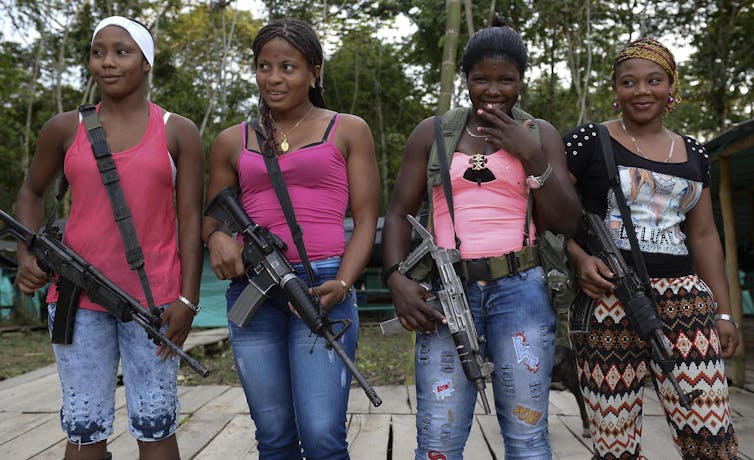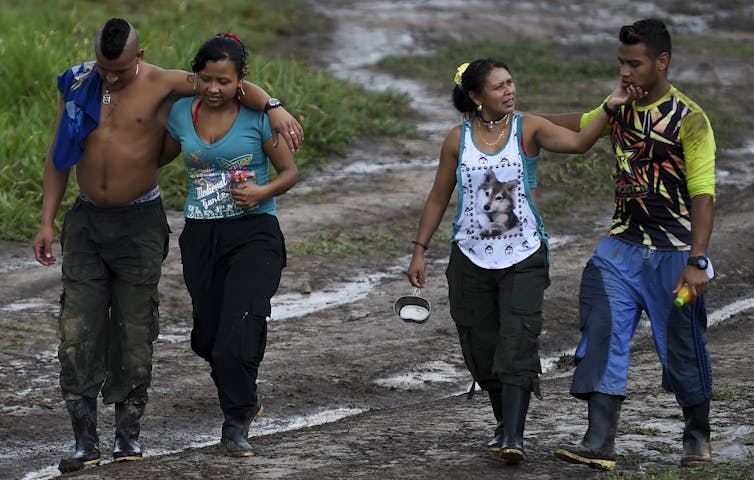A guerrilla-to-entrepreneur plan in Colombia leaves some new businesswomen isolated and at risk
- Written by Maria Paulina Arango, PhD candidate in International and Comparative Education at Florida State University and 2019-2020 USIP Peace Scholar, Florida State University
Women made up nearly a quarter of the 13,000 guerrilla fighters[1] disarmed by Colombia’s 2016 peace accord with the Revolutionary Armed Forces of Colombia, or FARC[2]. Though implementation has been halting[3], the landmark peace deal officially ended Colombia’s 52-year armed conflict with this Marxist rebel group.
But even before the peace deal more than 19,000 fighters – including thousands of women – had abandoned different Colombian guerrilla and paramilitary groups[4], voluntarily or after being captured by the army.
In exchange for disarming, Colombia offered this first group of ex-combatants training in accounting, stock management, market analysis, development of business plans and US$2,300 – roughly eight months of minimum wage earnings[5] – to start a small business[6]. With the government’s assistance, thousands of former female insurgents have started small home businesses, tailoring clothing, making handicrafts or selling food.
Now, the government is expanding its entrepreneurship program[7] to cover all 2,990 female FARC fighters disbanded under the 2016 peace deal[8].
So I wanted to check in on past beneficiaries to see how they were faring. For seven months in 2018 and 2019, as part of my dissertation research on Colombia[9], I conducted in-depth interviews with 12 retired female guerrilla fighters to document their transition back into civilian life.
They’re not doing so well.
Transforming identities
In Colombia, as in other conflict zones, rejoining society after war is generally more challenging for women[10].
Whether they served as soldiers, cooks, spies or sexual partners[11] to male fighters, women militants[12] are frequently seen as abnormal, or unfeminine. Fighting violates traditional expectation of women as the peaceful and nurturing[13] gender.
In Colombia, many of the women I interviewed said they were shunned when they returned to civilian life[14].
 Female FARC insurgents days before their relocation to government-run transition camps, Vegaez municipality, Antioquia department, Colombia, Dec, 30, 2016.
RAUL ARBOLEDA/AFP via Getty Images[15]
Female FARC insurgents days before their relocation to government-run transition camps, Vegaez municipality, Antioquia department, Colombia, Dec, 30, 2016.
RAUL ARBOLEDA/AFP via Getty Images[15]
“Even my family thought the worst of me – that I had become bloodthirsty or bad,” said a 33-year-old woman who was forced by her father to join the FARC when she was 17.
Other women reported feeling similar social exclusion. The perception of stigma prevented them from fully engaging with their local communities. All hid their pasts. Some avoided interacting with neighbors, afraid they would discover their secret.
This is the opposite of the government’s intention with the small business program, which aims to promote social interactions. Funded by the Colombian government, USAID and the United Nations[16] and designed following U.N. guidelines[17], entrepreneurship is supposed to help former insurgents gain community acceptance[18], take control over their circumstances, rejoin the labor market[19] and reduce poverty.
Promoting entrepreneurship is a popular development strategy for women, not just in conflict zones but also in poor countries with entrenched gender inequality. Since 2001 the World Bank has launched micro-lending and small grant programs in South Sudan, Liberia, Afghanistan, Haiti and Kosovo, among others[20].
However, their effectiveness is unproven[21], and some studies[22] find entrepreneurship does not meaningfully improve women’s lives.
Running a home business seemed to isolate the former insurgents in my study. More than half told me they were unable to form the kind of social support system that research shows is necessary for reintegration[23].
“I don’t like to go anywhere, I don’t like to visit anyone,” a 31-year-old woman told me.
She was particularly worried that if neighbors learned about her history as an rebel fighter, they would tell the gang members who control her neighborhood, endangering her life.
This social isolation effectively trapped some women in violent relationships[24]. One felt that working from home kept her from meeting new people who might have become a protective network.
“He punched me. I still have the bruise,” she said.
I could see the mark on her cheek. The attack was recent. The woman told me she hadn’t left the house in 15 days.
Constraints to social inclusion
Succeeding in business is difficult for anyone, in any country, under any circumstance. Research shows the chances for success are even lower[25] for poor female entrepreneurs.
My interviews in Colombia suggest that the Colombian government’s reliance on entrepreneurship may make female ex-insurgents financial situation even more precarious than it would otherwise be because they lack the safety net of formal employment.
“I was not used to having a business, so I gave credit to many people,” said one ex-combatant whose government seed-funded grocery store in Medellin, Colombia went broke.
When former insurgents who receive government benefits fail, they do not get another loan. They must find a job on their own[26].
 Many women left the FARC guerrilla group along with their partners, Colinas, Guaviare, Colombia, June 15, 2017.
RAUL ARBOLEDA/AFP via Getty Images[27]
Many women left the FARC guerrilla group along with their partners, Colinas, Guaviare, Colombia, June 15, 2017.
RAUL ARBOLEDA/AFP via Getty Images[27]
Another problem I identified with Colombia’s governmental entrepreneurship program was that it restricts grant recipients to low-skill jobs that may not align with an individual’s experience, skills and interests.
“My dream was to study dentistry, but I did not have a high school diploma,” a woman who was a dentist in the FARC told me. “I had to do tailoring.”
Sewing and selling underwear and jackets helped the former fighter support herself and her son through a divorce. But the work was not meaningful to her, and it did not further her long-term educational and career goals.
Running a small business at home also reinforced unequal distribution of family responsibilities[28] for many of the women I interviewed. Because they were in the house, they were expected to do all domestic chores and childcare – all while cooking, sewing or selling food.
Gender troubles
The former guerrilla fighters I interviewed are years into the reintegration process. Their struggles signal great challenges ahead for Colombia as it returns thousands of FARC women[29] back to civilian life by 2023[30], the timeline for completing the reintegration process.
In some ways, however, Colombia is actually ahead of the game. Gender-specific policies are in short supply in war zones globally.
“Peace agreements are still adopted without provisions considering the needs and priorities of women and girls,” said U.N. Secretary-General Antonio Guterres in October 2019[31].
He said a “pitifully small” amount of aid to fragile and post-conflict nations – just 0.2% – goes to “women’s organizations.”
Colombia’s accord tried to do better. At the FARC’s insistence[32], women were on the negotiating team. The accord specifically commits the state to promoting equal rights for women and men[33].
But my research suggests that making peace work for female insurgents will take more than a well crafted accord.
Stephanie Simmons Zuilkowski, a professor of international and multicultural education at Florida State University, contributed research to this article.
References
- ^ 13,000 guerrilla fighters (theconversation.com)
- ^ or FARC (theconversation.com)
- ^ halting (theconversation.com)
- ^ abandoned different Colombian guerrilla and paramilitary groups (www.reincorporacion.gov.co)
- ^ minimum wage earnings (stats.oecd.org)
- ^ start a small business (www.reincorporacion.gov.co)
- ^ the government is expanding its entrepreneurship program (www.reincorporacion.gov.co)
- ^ disbanded under the 2016 peace deal (pensamiento.unal.edu.co)
- ^ dissertation research on Colombia (independent.academia.edu)
- ^ more challenging for women (www.usip.org)
- ^ sexual partners (doi.org)
- ^ militants (theconversation.com)
- ^ nurturing (theconversation.com)
- ^ civilian life (www.un.org)
- ^ RAUL ARBOLEDA/AFP via Getty Images (www.gettyimages.com)
- ^ United Nations (escolapau.uab.cat)
- ^ U.N. guidelines (www.unddr.org)
- ^ gain community acceptance (doi.org)
- ^ labor market (www.reincorporacion.gov.co)
- ^ among others (openknowledge.worldbank.org)
- ^ unproven (dx.doi.org)
- ^ studies (theconversation.com)
- ^ shows is necessary for reintegration (dx.doi.org)
- ^ violent relationships (doi.org)
- ^ even lower (dx.doi.org)
- ^ on their own (www.redjurista.com)
- ^ RAUL ARBOLEDA/AFP via Getty Images (www.gettyimages.com)
- ^ unequal distribution of family responsibilities (www.unfpa.org)
- ^ FARC women (theconversation.com)
- ^ by 2023 (www.reincorporacion.gov.co)
- ^ said U.N. Secretary-General Antonio Guterres in October 2019 (www.un.org)
- ^ FARC’s insistence (www.semana.com)
- ^ equal rights for women and men (kroc.nd.edu)
Authors: Maria Paulina Arango, PhD candidate in International and Comparative Education at Florida State University and 2019-2020 USIP Peace Scholar, Florida State University

